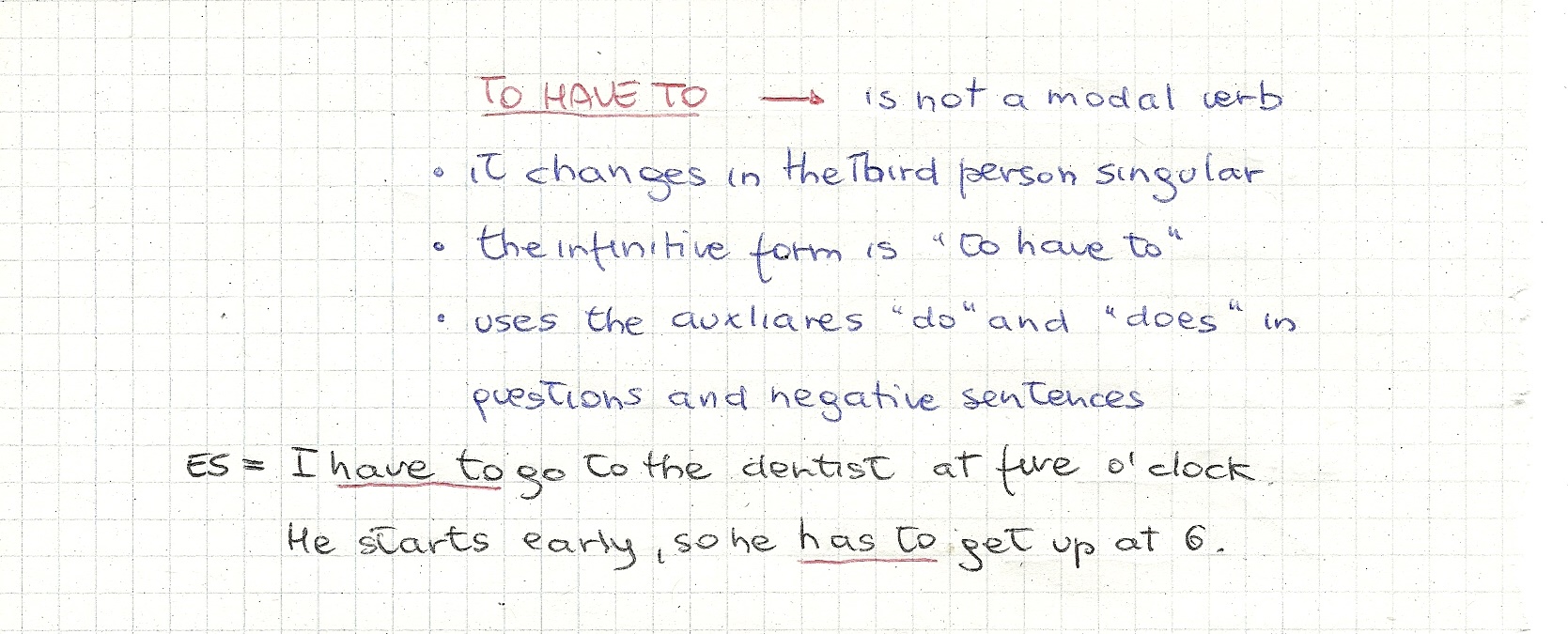Now we are going to look at two verbs used in English to indicate obligation. Often people get confused with the modal verb “must” and the verb “to have to” and are unsure how to use them correctly. I will show you how.
Oggi daremo un’occhiata a due verbi che si usano in inglese per esprimere un obbligo. Le persone si confondono spesso con il verbo modale “must” ed il verbo “to have to” e non sanno come usarlo correttamente. Oggi te lo spiego!
Both “must” and “to have to” express obligation, often strong obligation depending on the tone of the speaker or the situation. However, there is a slight difference in the way they are used.
Sia “must” che “to have to” esprimono un obbligo, spesso molto autorevole in base al tono dell’emittente. Tuttavia esiste una leggera differenza tra i due.
“must” often shows that the obligation is not external or is not a rule or law. It is expressed by the speaker and is often the speaker’s opinion. For example,
“must” di solito esprime un obbligo che non viene dall’esterno, che non è una regola né una legge. Viene espresso dall’emittente e di solito è una sua opinione. Ad esempio:
• You must be on time tomorrow or you will be in trouble.
• Devi essere puntuale domani o saranno guai.
• I must call my mother tonight.
• Devo chiamare mia madre stasera.
• You must come to my new house as it has been ages since you last visited us.
• Devi venire a vedere la mia casa nuova, perché è già da molto che non ci vieni più a trovare.
“must” often indicates stronger obligation than “to have to“.
“to have to” shows us that the obligation comes from something or someone else. Normally it is a law or rule. For example:
“to have to” indica che l’obbligo proviene da qualcosa o qualcun altro. Di solito è una legge o una regola. Ad esempio:
• In class you have to switch off your phones.
• Dovete spegnere i telefoni in classe.
• I have to hand in my assignment tomorrow; it’s the last day.
• Domani devo consegnare il mio lavoro; è l’ultimo giorno.
• John has to work every day just like the rest of us.
• John deve lavorare tutti i giorni come tutti noi.
They take on totally different meanings, however, when used in the negative.
“must not” (or its contracted form “mustn’t“) expresses prohibition.
• You mustn’t hit you sister.
• Non devi picchiare tua sorella.
• They mustn’t talk in the exam or they will be punished.
• Non devono parlare durante l’esame o verranno puniti.
do not have to (or its contracted form don’t have to) or does not have to (or its contracted form doesn’t have to) are used to state that there is NO obligation to do something or that something is not necessary.
• We don’t have to go to school on Saturday.
• Non dobbiamo andare a scuola di sabato.
• The students don’t have to study any more as the exams are all finished.
• Gli alunni non devono più studiare dato che sono finiti gli esami.
• He doesn’t have to sign the documents if he doesn’t want to.
• Non deve firmare i documenti se non vuole.
As you probably already know, “must” expresses obligation and “mustn’t” expresses prohibition.
Look at some rules you might find on a piece of paper on the wall in a classroom where people are studying English.
Osserva alcune regole che potrebbero trovarsi alle pareti di un’aula d’inglese.
You must listen to the teacher.
Devi ascoltare l’insegnante.
You must do your homework.
Devi fare i compiti.
You must try to speak in English at all times.
Devi cercare di parlare sempre in inglese.
You must follow the teacher’s instructions.
Devi seguire le istruzioni dell’insegnante.
You mustn’t chew gum.
Non devi mastigare gomme.
You mustn’t shout.
No devi gridare.
You mustn’t speak when the teacher is speaking.
Non devi parlare quando sta parlando l’insegnante.
You mustn’t run in the classroom.
No devi correre nell’aula.
The most important rule when studying English in a classroom is “You must try to speak in English at all times”!
A good rule for online students is “You must try to write to your teacher in English at all times” 😉
Una buona regola per studenti come te che stanno seguendo un corso d’inglese online è “Devi cercare di scrivere sempre in inglese alla tua teacher!” 😉

